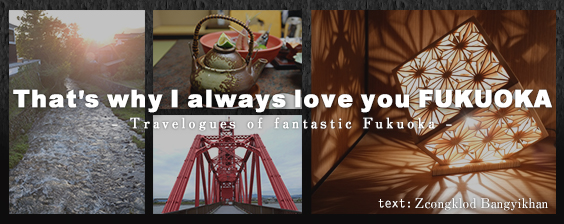- Home
- feature
- anime
- Feature “After School Midnight...
- “After School Midnighters”Excl...
“After School Midnighters”Exclusive Interview(3/5)
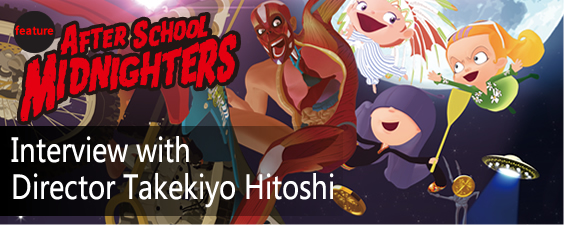
I think there is a connection between the digital world and the creativity that Fukuoka helps nurture.
ab:I have heard that Fukuoka Prefecture is getting behind the digital content industry and there are many active in the industry in Fukuoka. What do you think about this?
Takekiyo: I often hear that there are a lot of creators in Fukuoka, but we are based in Fukuoka so we don’t really get that vibe. Compared to Tokyo our budgets are much lower, but our ideas make up for the lack of funds, that is probably why it has such a reputation - especially when it comes to TV commercials and ads. I think this is why the digital content business in Fukuoka is starting to take off.
Do you think there is a relationship with the character of the region?
Takekiyo: I think it has to do more with the people than the place. You can’t do anything unless people come together, and Fukuoka is a place where it is easy to get together. I know a few creators who have moved from Tokyo to Fukuoka. It may be a slightly delicate issue but especially after the earthquake and tsunami disaster. It has been said for a while among creators that you don’t really have to be in Tokyo, and that is maybe one reason why they come to Fukuoka. There is work in Tokyo, but as a place to live I reckon that this is the best place, and if there is work in regional centers, you find there are plenty of people who would rather live there than Tokyo.
Takekiyo: I often hear that there are a lot of creators in Fukuoka, but we are based in Fukuoka so we don’t really get that vibe. Compared to Tokyo our budgets are much lower, but our ideas make up for the lack of funds, that is probably why it has such a reputation - especially when it comes to TV commercials and ads. I think this is why the digital content business in Fukuoka is starting to take off.
Do you think there is a relationship with the character of the region?
Takekiyo: I think it has to do more with the people than the place. You can’t do anything unless people come together, and Fukuoka is a place where it is easy to get together. I know a few creators who have moved from Tokyo to Fukuoka. It may be a slightly delicate issue but especially after the earthquake and tsunami disaster. It has been said for a while among creators that you don’t really have to be in Tokyo, and that is maybe one reason why they come to Fukuoka. There is work in Tokyo, but as a place to live I reckon that this is the best place, and if there is work in regional centers, you find there are plenty of people who would rather live there than Tokyo.
ab:I have the image that the place where most people from the same industry get together for work, would be Tokyo. Is that really so?
Takekiyo: Basically that is right. However, 15 years ago when I started at my previous company, it was the dawn of the era where you could make vision if you had the digital infrastructure and computers. So, if you met someone just once, it didn’t matter how far away you were because we could transfer data digitally. If you are in regional Japan there is no disadvantage in communicating, so it made no difference. I think there is a connection between the digital world and the creativity that Fukuoka helps nurture.In the way it opens many doors. If you are making a movie, even now Tokyo is much more convenient, but now it is not necessarily the only option.
Takekiyo: Basically that is right. However, 15 years ago when I started at my previous company, it was the dawn of the era where you could make vision if you had the digital infrastructure and computers. So, if you met someone just once, it didn’t matter how far away you were because we could transfer data digitally. If you are in regional Japan there is no disadvantage in communicating, so it made no difference. I think there is a connection between the digital world and the creativity that Fukuoka helps nurture.In the way it opens many doors. If you are making a movie, even now Tokyo is much more convenient, but now it is not necessarily the only option.
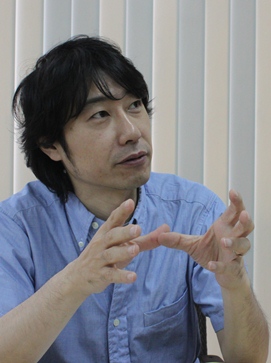
It is not the case that Fukuoka, or for that matter Sapporo is better. I am not from the big city so I just can’t take it easy in Tokyo (lol) – I feel the place is trying to drive me away.In Tokyo the information finds you. That’s what makes you anxious, you just can’t keep up. But here in Fukuoka you can work at your own pace and if you want to find out something you go and get the information. For me that is the advantage of working in Fukuoka. I think it would be great if others come to Fukuoka or they learn the trade here. Pixar isn’t in the middle of a big city, it is in the suburbs. It’s not where you are located. But having said that, if you are working you have to live somewhere, and a more livable place is better. From that angle, Fukuoka is a really good place to live and work. If you live here you will understand. But unless the creativity flows you wouldn’t think about moving to regional Japan either.
ab:If you can make top line product others would think about living here too.
Takekiyo: For a while I though like that about Silicon Valley. People getting together there, in the middle of nowhere, and creating networks. New connections lead to the possibility of new ideas. That’s what happens when people get together.
ab:It seems like the attraction of a city is the networks the people create there.
Takekiyo: You can say that for Japan. It has been said that Fukuoka is close to Asia. I am currently doing work for Taiwanese and Korean companies. I go to meet them once and go out drinking with them and get to understand where they are at. Then we hook up on Skype all the time- “Is it lunch over there? I think I will go out for lunch too”. It is easy to link up with people these days. I think if politicians created a preferential tax policy between cities there would be a major effect somewhere. For example Singapore and Canada have such policies. The special economic zone established there has led to production teams from all over the world congregating there. I think Fukuoka has this potential. Whether they can make such a policy which would bring substantial results would have a major effect on the city.
ab:It would also be interesting if people didn’t just gather in a single city, but if different cities could link up and produce something.
Takekiyo: I agree. The movie I am working on now is an animation, but up until now anime has mainly been built on the domestic Japanese market. However, with the falling birthrate and DVDs sales down the market is stagnating. The future is bleak if we don’t do something. In the current climate people just don’t know how to approach the overseas market.But we now know that we have no choice. Not just Japanese alone, but working with Asia it is easier to find out what people overseas think it funny- finding out where their funny bone is. Japanese and foreigners have a different sense of what is funny, and of course it sometimes overlaps too. If we can build on this I think that the Japanese entertainment industry has great potential. The number of joint projects between not just Fukuoka, but also Asia and Japan is growing.
Takekiyo: For a while I though like that about Silicon Valley. People getting together there, in the middle of nowhere, and creating networks. New connections lead to the possibility of new ideas. That’s what happens when people get together.
ab:It seems like the attraction of a city is the networks the people create there.
Takekiyo: You can say that for Japan. It has been said that Fukuoka is close to Asia. I am currently doing work for Taiwanese and Korean companies. I go to meet them once and go out drinking with them and get to understand where they are at. Then we hook up on Skype all the time- “Is it lunch over there? I think I will go out for lunch too”. It is easy to link up with people these days. I think if politicians created a preferential tax policy between cities there would be a major effect somewhere. For example Singapore and Canada have such policies. The special economic zone established there has led to production teams from all over the world congregating there. I think Fukuoka has this potential. Whether they can make such a policy which would bring substantial results would have a major effect on the city.
ab:It would also be interesting if people didn’t just gather in a single city, but if different cities could link up and produce something.
Takekiyo: I agree. The movie I am working on now is an animation, but up until now anime has mainly been built on the domestic Japanese market. However, with the falling birthrate and DVDs sales down the market is stagnating. The future is bleak if we don’t do something. In the current climate people just don’t know how to approach the overseas market.But we now know that we have no choice. Not just Japanese alone, but working with Asia it is easier to find out what people overseas think it funny- finding out where their funny bone is. Japanese and foreigners have a different sense of what is funny, and of course it sometimes overlaps too. If we can build on this I think that the Japanese entertainment industry has great potential. The number of joint projects between not just Fukuoka, but also Asia and Japan is growing.
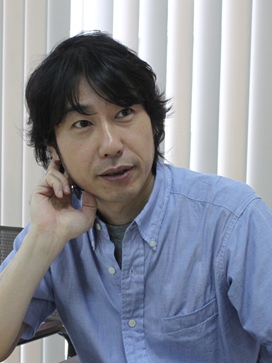
ab:Your current film will be screened simultaneously in over 5 countries. Do you feel there is any difference in the reactions in Japan and other Asian countries?
Takekiyo: I will soon find out. It is very exciting. What kind of a reaction will it receive at the cinema? I hope the overseas audiences will enjoy it. For example all the jokes that would only be understood by the Japanese have been cut, even if they are funny. I was also careful to make designs that would be acceptable for the overseas audience. I’m half anxious and half excited.
ab:Do you have a message for the youth of Asia reading this site?
Takekiyo: I will soon find out. It is very exciting. What kind of a reaction will it receive at the cinema? I hope the overseas audiences will enjoy it. For example all the jokes that would only be understood by the Japanese have been cut, even if they are funny. I was also careful to make designs that would be acceptable for the overseas audience. I’m half anxious and half excited.
ab:Do you have a message for the youth of Asia reading this site?
Takekiyo: Ah, that’s something I often get asked, “do you have a message”? I don’t have a message (lol). For example you could say that Ghost Busters was absurd, and wasn’t a movie that would make you cry, but it still was a movie loved by many around the world.It’s funny, but I’ve recently been thinking how a well made movie does not necessarily become a well loved movie. Sometimes they do though. Once you get to like that kind of movie I think you come to prefer those with slight imperfections. It’s the same with people - a person’s imperfection seems to grow on you. If my film becomes loved in this way I will be very happy.
Director Takekiyo Hitoshi
■PROFILE
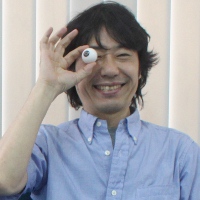
Born 1967. Graduated from Kyushu Institute of Design (Currently Kyushu University).
Worked for Toei, Kobe Design University, co-founder of KOO-KI, 2012 established Mont Blanc Pictures entering the world of visual entertainment.
His deep knowledge of both analog and digital technology is behind the creation of stylish works which have received high acclaim both in Japan and abroad. His short film BANANA is part of the MoMA (New York Museum of Modern Art) Collection.
■Mont Blanc Pictures
http://mtblanc.jp/

Born 1967. Graduated from Kyushu Institute of Design (Currently Kyushu University).
Worked for Toei, Kobe Design University, co-founder of KOO-KI, 2012 established Mont Blanc Pictures entering the world of visual entertainment.
His deep knowledge of both analog and digital technology is behind the creation of stylish works which have received high acclaim both in Japan and abroad. His short film BANANA is part of the MoMA (New York Museum of Modern Art) Collection.
■Mont Blanc Pictures
http://mtblanc.jp/
 Measures and provisions are being taken at various locations in an effort to prevent the spread of the new coronavirus.
Measures and provisions are being taken at various locations in an effort to prevent the spread of the new coronavirus.






